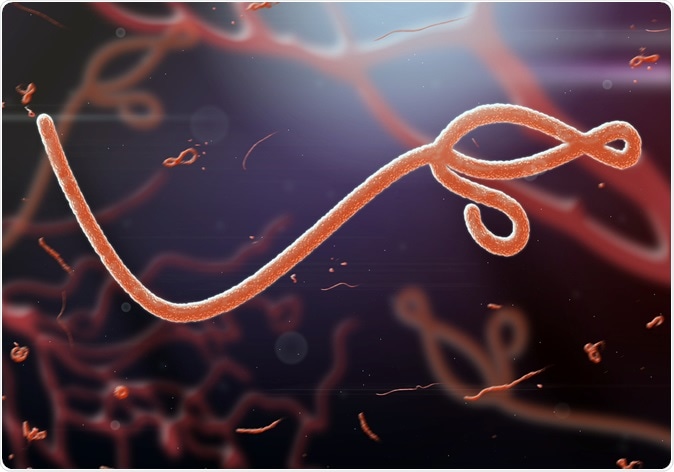Yesterday (8th May 2018), the Government of the Democratic Republic of the Congo declared a new outbreak of Ebola in the rural northwest of the country. This came after two cases of Ebola were confirmed in regions of Bikoro.
According to the health ministry of Congo, five samples were sent to the Institut National de Recherche Biomédicale (INRB) in Kinshasa. Of these, two came back to be positive for Zaire strain of Ebola virus. These belong to the Equateur Province. Ebola was first identified in 1976 in Congo and this is the 9th such outbreak in the country.

Microscopic view of the Ebola virus. Image Credit: Jaddingt / Shutterstock
The Equateur Province Health Ministry notified the institute at Kinshasa on the 3rd of May of the 21 cases of hemorrhagic or bleeding fevers in Ikoko Impenge area. At least 17 succumbed to these hemorrhagic fevers said the World Health Organization (WHO) and Congo government. The team from WHO and Doctors Without Borders looked at the possible causes of these fevers because several other diseases and viruses could also cause these fevers. The team identified 5 new suspect cases which were then sent forth to National Institute of Biological Research in Kinshasa. There have been no further reports of deaths.
According to a statement from the ministry, the team would go to Bikoro today to prevent the spread of this infection further. They will also look at the origin of the infection and how the outbreak began.
The last outbreak in Congo was in 2017 May and it killed four out of eight individuals in the Bas-Uele province, northeast Congo. It was in July 2017 that the outbreak was contained and stopped. Other outbreaks in Sierra Leone, Liberia and Guinea started in 2014 and killed over eleven thousand deaths in their wake.
Ebola spreads to humans from animals such as bats, monkeys etc. It kills nearly 90 percent of all infected. Stopping the spread of the infection is one of the only measures to contain the infection at present due to lack of curative treatment and effective vaccines.
Dr. Peter Salama, WHO Deputy Director-General, Emergency Preparedness and Response in his statement regarding this latest outbreak said, “Our top priority is to get to Bikoro to work alongside the Government of the Democratic Republic of the Congo and partners to reduce the loss of life and suffering related to this new Ebola virus disease outbreak… Working with partners and responding early and in a coordinated way will be vital to containing this deadly disease.” Matshidiso Moeti, the WHO Regional Director for Africa added in a statement, “We know that addressing this outbreak will require a comprehensive and coordinated response. WHO will work closely with health authorities and partners to support the national response. We will gather more samples, conduct contact tracing, engage the communities with messages on prevention and control, and put in place methods for improving data collection and sharing.”
More experts in a multidisciplinary team from WHO, Médecins Sans Frontières and Provincial Division of Health are expected to reach the area for further analysis and prevention of spread. WHO has released US$ 1 million from its Contingency Fund for Emergencies for these activities over the next three months.